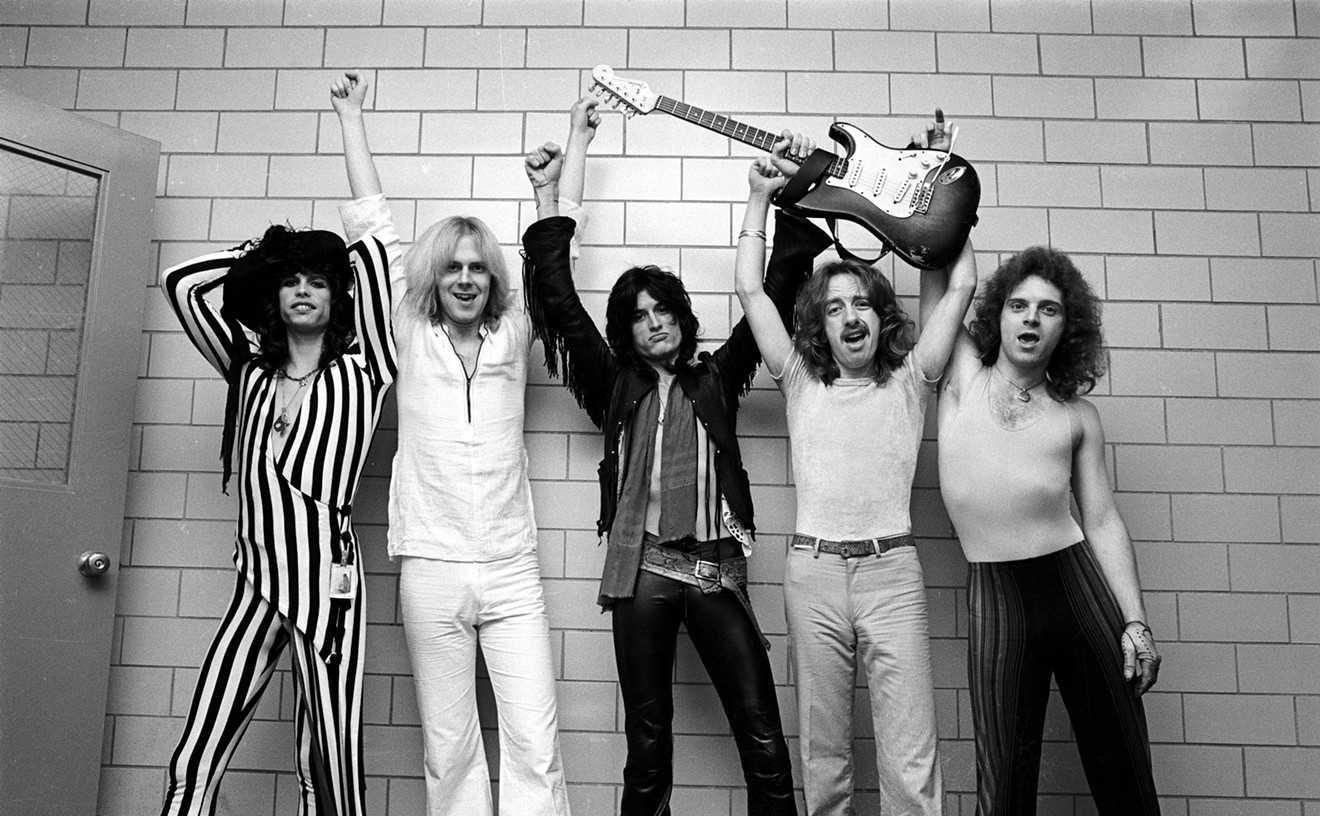In 1966, Bruce and Baker were the best rhythm section in rock, Clapton was God, and the sonic blueprint led to four classic albums and such signature rock tunes as "White Room," "Sunshine of Your Love," and the thundering, psychedelic live reworking of the Robert Johnson blues staple "Crossroads." For three years — their superstar egos would tear them apart — Cream proved that musicians who are singularly talented and individually famous of their own accord can produce great music together.
Because they were great, it's a shame we have to pin the supergroup phenomenon on Cream. The concept that worked so well for that band has since been abused, creating such execrable "supergroups" as Asia, The Firm, Bad English, and Damn Yankees, bands whose ingredients included past-their-prime players taking another stab at rock 'n' roll relevance. These groups muddied up the Cream-concocted formula and watered it down with blatant attempts to score radio hits in the early MTV era. (It's truly mind-blowing to consider that guitarist Steve Howe, who practically single-handedly invented prog-rock guitar playing with Yes, would dumb himself down enough to become a member of Asia and then deign to get within spitting distance of the band's hurl-worthy 1982 Top 10 abomination "Heat of the Moment.") As a result of such bands, the term "supergroup" has, in the present tense, become a euphemism for "self-important mediocrity."
The past few years alone have produced such don't-quit-your-day-job supergroups as Probot (led by Dave Grohl and a who's who of metal players), The Raconteurs (Jack White and Brendan Benson), Them Crooked Vultures (Grohl again, along with Queens of the Stone Age's Josh Homme), and perhaps the weirdest of them all, Tinted Windows (Taylor Hanson from his surnamed boy band, The Smashing Pumpkins' James Iha, Fountains of Wayne's Adam Schlesinger, and Cheap Trick drummer Bun E. Carlos), who actually released a pretty good self-titled power-pop record earlier this year.
Then there's the latest entry into the new-millennium supergroup sweepstakes, Chickenfoot.
The mere name of this band should lead one to deduce that these dudes aren't taking themselves all that seriously (you can almost hear a Greek chorus of stoners going, "Duuude, Chickenshit. Huh-huh, huh-huh"), but perhaps that's the point. And maybe they are ultimately even better for it.
In breaking down the components of the group, only drummer Chad Smith can still be considered a chart-topper, as his main gig playing with Red Hot Chili Peppers allows him to perform with a group that still fills arenas.
Guitarist Joe Satriani deserves critical kudos for being one of the best rock guitarists ever to pick up a six-string, but his fan base is made up mainly of wanna-be guitarists who get geeky over Satch's blistering solos, and that kind of audience doesn't exactly rocket albums into the Top 10 and put tens of thousands of asses in the seats.
Then there are the two dudes who've experienced the ignominy of running afoul of Van Halen (or more specifically, Eddie Van Halen), which appears to repel singers like Off bug spray. Sammy Hagar, who had a successful solo career in the '80s — peaking with the ham-fisted ode to speeding "I Can't Drive 55" — sang for the mega-selling VH for 10 years before either being fired (according to Eddie) or quitting (according to Sammy) in 1996. Bassist Michael Anthony was replaced by a 16-year-old kid for Van Halen's recent comeback tour. Even though the 16-year-old kid in question, Wolfgang Van Halen, is loaded with his pop Eddie's musical DNA and subsequently proved himself worthy of his new gig (despite the blatant nepotism), he's still a 16-year-old kid and that has to stick in Anthony's craw at least a little.
You'd probably expect Chickenfoot to offer up some '80s-style butt rock, replete with big guitar riffs and heavy-handed lyrics filled with sexual innuendo. And that's exactly what they serve up on their debut album. But although delivering the expected makes Chickenfoot a success on a certain level, it's still '80s-style butt rock. And even in that sonorous genre, it's not even as good as the touring versions of Def Leppard and Poison who played their old hits at Cricket Wireless Pavilion last month.
It's safe to say that there will never be another Cream, as most supergroups in the present state of rock seem like side projects, ways for the band's members to kill time without having to chase a little white ball around a golf course in between their "real" projects. But the legion of supergroup failures in the past four decades doesn't keep artists from grouping up and trying to capture lightning in a bottle. Are Chickenfoot going to sell records? Sure. Their self-titled debut album entered the charts in the top five. Are Hagar, Anthony, Satriani, and Smith having a good time? Undoubtedly. But are they going to make listeners forget about Van Hagar or Red Hot Chili Peppers? Hell, are they even going to make listeners forget about Asia and Damn Yankees? Probably not.
So let them play Dodge and let them rock the crowd. Can we at least stop calling outfits like these supergroups?










